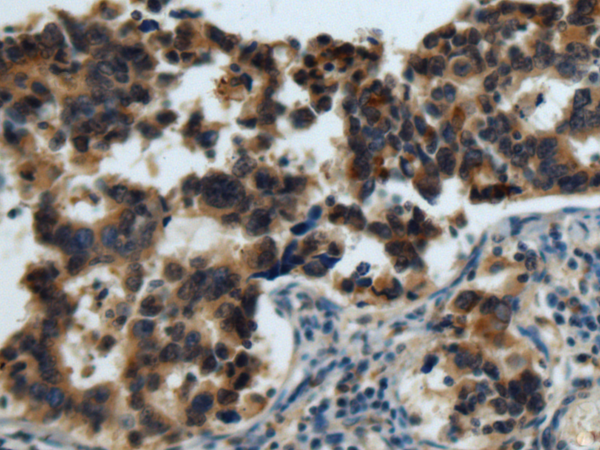
| WB | 咨询技术 | Human,Mouse,Rat |
| IF | 咨询技术 | Human,Mouse,Rat |
| IHC | 1/50-1/200 | Human,Mouse,Rat |
| ICC | 技术咨询 | Human,Mouse,Rat |
| FCM | 咨询技术 | Human,Mouse,Rat |
| Elisa | 1/5000-1/10000 | Human,Mouse,Rat |
| Aliases | HTK; MYK1; HFASD; CMAVM2; LMPHM7; TYRO11 |
| Host/Isotype | Rabbit IgG |
| Antibody Type | Primary antibody |
| Storage | Store at 4°C short term. Aliquot and store at -20°C long term. Avoid freeze/thaw cycles. |
| Species Reactivity | Human, Mouse |
| Immunogen | Synthetic peptide of human EPHB4 |
| Formulation | Purified antibody in PBS with 0.05% sodium azide and 50% glycerol. |
+ +
以下是关于EPHB4抗体的3篇代表性文献及其摘要概括:
---
1. **文献名称**:*Targeting EPHB4 with antibody-based therapeutics suppresses tumor growth and metastasis in preclinical models of solid tumors*
**作者**:Martiny, V. et al.
**摘要**:该研究开发了一种靶向EPHB4的单克隆抗体,通过抑制肿瘤血管生成和肿瘤细胞迁移,在多种实体瘤(如乳腺癌、结肠癌)的临床前模型中显著减少肿瘤生长和转移。研究强调了EPHB4作为癌症治疗靶点的潜力。
---
2. **文献名称**:*EPHB4 inhibition as a therapeutic strategy for preeclampsia by blocking placental angiogenesis defects*
**作者**:Deng, Y. et al.
**摘要**:本文探讨了EPHB4抗体在子痫前期模型中的作用,发现阻断EPHB4可改善胎盘血管异常生成,缓解病理症状。研究为EPHB4抗体在妊娠相关血管疾病中的治疗应用提供了依据。
---
3. **文献名称**:*Antibody-drug conjugates targeting EPHB4 exhibit potent antitumor activity in ovarian cancer models*
**作者**:Li, H. et al.
**摘要**:该研究构建了一种靶向EPHB4的抗体-药物偶联物(ADC),在卵巢癌模型中显示出高效杀伤肿瘤细胞的能力,同时减少对正常组织的毒性,验证了EPHB4抗体在精准癌症治疗中的可行性。
---
这些文献涵盖了EPHB4抗体在肿瘤治疗、血管疾病干预及药物开发中的关键应用方向。
The EPHB4 antibody targets EPHB4. a member of the Eph receptor tyrosine kinase family, which plays critical roles in cell-cell communication, tissue patterning, and vascular development. EPHB4 interacts with its ligand EFNB2 to regulate bidirectional signaling, influencing cell adhesion, migration, and angiogenesis. Notably, EPHB4 is essential for venous specification during embryogenesis, where its activation ensures proper blood vessel formation. Dysregulation of EPHB4 signaling is implicated in pathologies, including cancer and vascular disorders. Overexpression of EPHB4 has been observed in malignancies such as breast, colorectal, and ovarian cancers, where it promotes tumor growth, metastasis, and resistance to therapy by enhancing angiogenesis and survival pathways.
EPHB4 antibodies are therapeutic or research tools designed to block receptor-ligand interactions or inhibit downstream signaling. Preclinical studies show that anti-EPHB4 antibodies can suppress tumor progression by disrupting angiogenesis and inducing apoptosis in cancer cells. Additionally, they are explored for treating conditions like retinopathy and atherosclerosis, where abnormal vascular remodeling occurs. Challenges include optimizing specificity to minimize off-target effects and understanding context-dependent signaling outcomes, as EPHB4 can exhibit both tumor-promoting and tumor-suppressive roles depending on the microenvironment. Current research focuses on antibody-drug conjugates and combination therapies to enhance efficacy, positioning EPHB4 as a promising yet complex target in precision medicine.
×